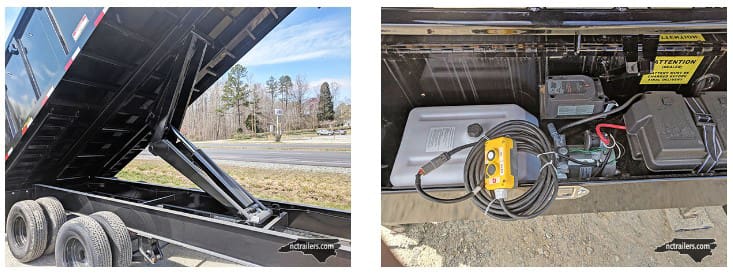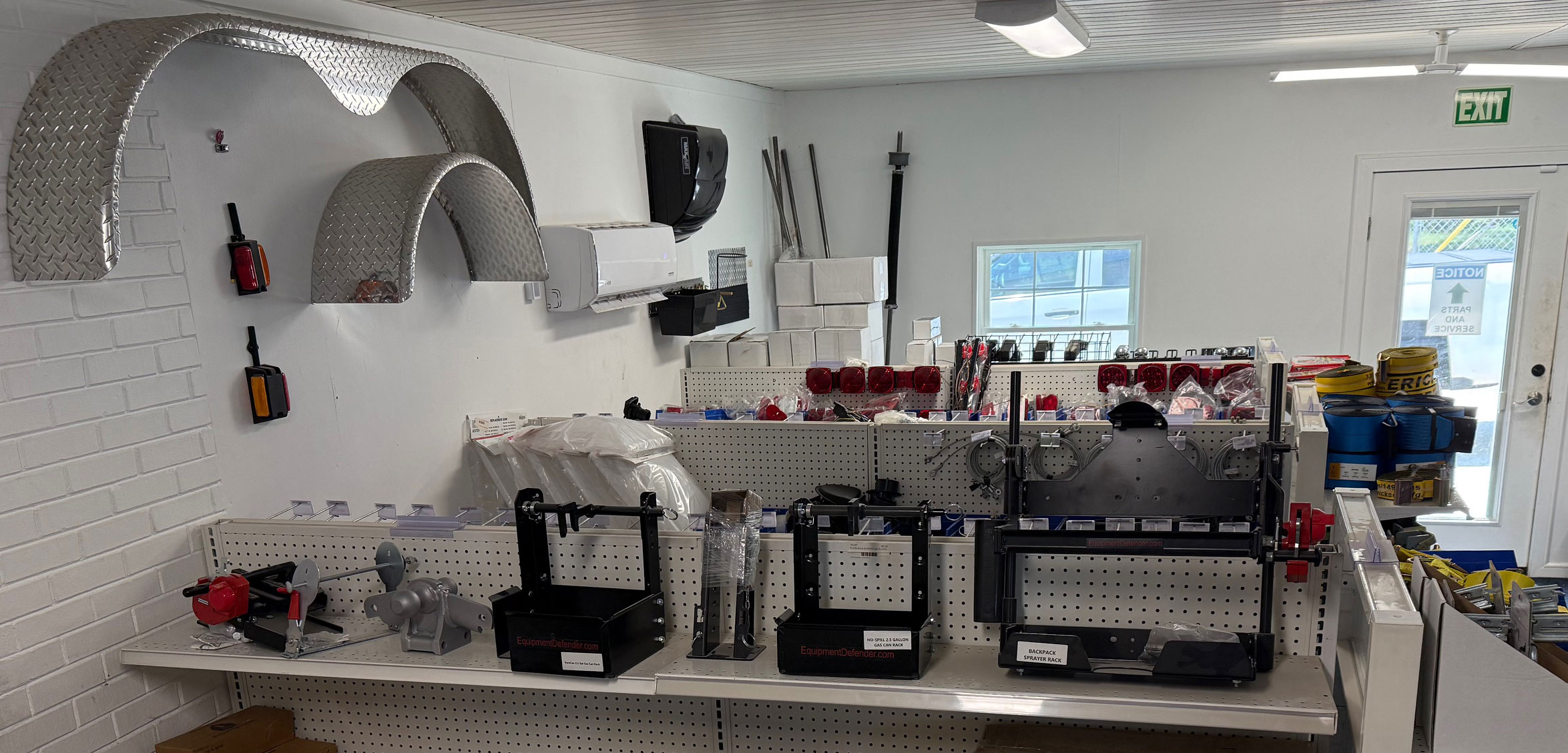Dump trailers are a favorite way for contractors and individuals managing smaller-sized projects to attain the functionality and convenience of a dump trailer without the size and heft of the full-size dump truck. Dump trailers provide easy loading, hauling, and dumping with more maneuverability than a traditional big construction vehicle. One advantage to utilizing a dump trailer on the worksite is that the trailer can be unhitched and secured on-site with a trailer coupler lock, allowing the continued use of the tow vehicle for doing errands or driving home.
A dump trailer is a piece of equipment used for the transportation of different types of loose materials such as sand, gravel, mulch, and dirt. Dump trailers equipped with ramps allow for additional functionality, including storing and transporting equipment such as skid steers and side-by-sides. Dump trailers are typically equipped with an electronically controlled hydraulic lift dump bed with a hinged back. If you are locally searching or on the internet looking for dump trailers for sale, you might be surprised by the sheer number of types, configurations, and sizes that are available for purchase.

We offer dump trailers with GVWR from 7K up to 25K. Goosenecks typically provide the largest weight-carrying capacities.
Size is one of the main characteristics that differentiate the various dump trailers. Size may be chosen depending on the application. A commercial farm operation may require a large deck-over tandem dually dump trailer (up to 8'x20' in size with 4' walls) like the Big Tex 25DU, while a golf course facility may need a small dump trailer to be able to maneuver through smaller and more delicate pathways (down to 5'x10' in size with 2' walls) like the Big Tex 70SR.
The size of a dump trailer will also determine its weight capacity. So even though a golf course facility may need a smaller size 5'x10' dump trailer for maneuverability, they will also need to consider the weight of their haul to ensure that whatever size they choose can accommodate the weight of their estimated heaviest load. For example, the max payload for a 5'x10' dump trailer is around 5,200 lbs versus an 8'x20' Gooseneck Dump that can haul around 17,500 lbs.

Scissor lift + single hydraulic piston + remote control = Easiest way to raise and lower your heaviest of hauls.
All dump trailers have a dump function, but they differ in how they perform that function. The most popular choice for most purposes is the electric hydraulic pump with remote control capability. This provides the most ease of use and convenience. For a lower cost, there is an option for manual hydraulic dump trailers. These use hydraulic technology but without the electric, automated functionality. The decision to make here depends on the load capacity of a typical haul. The electric hydraulic trailer is going to be a better option for larger hauls, but if cost is an issue and the projects tend to be smaller in size, scope, and load, then a manual hydraulic trailer might be a good choice.

Combo gates, d-rings, and slide-in ramps provide the versatility to haul materials and equipment.
One key component of a dump trailer that is often overlooked is the rear doors. If you are strictly looking to dump loose materials, you likely just need a dump gate that pivots along the top of the door to allow materials to flow freely out the bottom. If you have a trailer with ramps and plan to use it for hauling both equipment and materials, barn doors are a necessary option that allows you to "completely" fold the doors away from the rear opening to provide the maximum clearance between the walls. Most trailers today offer what is called a "combo gate" that provides up to 3 functionalities, including dump gate, barn door, and fold-down (think pickup truck tailgate) options.

Big Tex dump trailers often come with a wide variety of accessories standard on their offerings.
There are plenty of options and accessories that can help tailor your trailer to your specific dump trailer needs. We've already discussed things like slide-in ramps, D-rings, stake pockets, and wired remote controls, but there are additional items to consider, including tarp kits, wireless remotes, and various straps, locks, and latches to secure your load and your trailer. These accessories help to further configure your dump trailers/a> to best meet the demands of the job, not to mention meet local county and state laws that require loads to be covered and/or secured.

On the left, you can see a typical "deck-over" model, and on the right, a "lowrider" model.
The dump trailer style needed will depend partly on the jobs that must be performed and partly on the vehicles doing the pulling. Dump trailers come in deck-over, lowrider, and gooseneck hitch styles. Deck-over dump trailers are designed so that the bed of the trailer sits over the tires. Lowrider profiles are designed with the wheels located outside of the box so that the trailer bed sits lower to the ground for easier loading and unloading. The gooseneck hitch accommodates vehicles with this kind of hitch capacity and is generally manufactured in larger sizes with bigger weight limits. Researching brands, manufacturers, sources, pick-up locations, delivery options, and pricing are going to be the next steps in the process.
CONCLUSION
When choosing a dump trailer for your business, it is important to know that these trailers come in various designs depending on their particular application. You need to take into consideration if the design is suitable for your work requirements. They are categorized based on bed types and style of dumping as well as the number of axles, the terrain for which it is better suited, the design of the body frame, and most importantly its capacity.
Call (336) 276-0329 to talk to an experienced trailer sales professional to discuss your specific dump trailer needs.


 About the Author
About the Author


